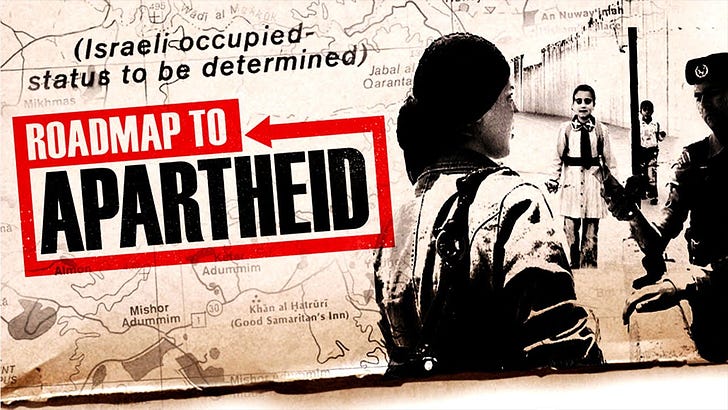John Pilger was one of the great authentic journalists who fulfilled his remit like few others, travelling to war zones and hot spots to investigate on the ground what was really going on. Most fortunately for us, John Pilger continues to live through his large body of work.
As someone who travelled the world to document the dark underbelly of countries and conflicts, it comes as no surprise that occupied Palestine was on his list.
John Pilger’s first film published on this topic in 1974, Palestine Is Still the Issue was followed by Palestine Is Still the Issue in 2002.
We are now in the year 2024 and Palestine Is Still the Issue.
Please note that this post is too long for email. Please click on the title to read and watch the material on Substack.
The following is the description for John’s film as published on his website.
Palestine Is Sill the Issue
Almost 30 years apart, John Pilger's two documentaries about Palestine carried the same title, Palestine is Still the Issue. His point was that, in the course of a generation, a great injustice remained unchanged and urgent.
His 1974 film described the flight and expulsion of almost a million Palestinians, who became refugees in their own land – at the creation of the state of Israel in 1948, then as a result of the Six Day War in 1967.
‘What has changed,’ says Pilger on his return to film his 2002 documentary, ‘is that the Palestinians have fought back. Stateless and humiliated for so long, they have risen up against Israel’s huge military regime, although they themselves have no army, no tanks, no American planes and gunships or missiles… For [them], the overriding, routine of terror, day after day, has been the ruthless control of almost every aspect of their lives, as if they live in an open prison.’
The Palestinians' struggle for their land is the theme of both films. The loss of 78 per cent of land in 1948 meant that they could claim only the remaining 22 per cent, which was occupied by Israel. They fought mainly with slingshots against tanks and planes during their first uprising, the 1987 intifada, and rose again and again.
The curfews, controls, roadblocks and checkpoints governing their lives bear comparison with apartheid South Africa, says Pilger, who interviews both Palestinians and Israelis, making his report infinitely more powerful than if it had given voice simply to the oppressed. Indeed, the majority of his witnesses are Israeli. The longest interview is one of the most revealing – with Dori Gold, an influential figure at the heart of Israeli power.
A Palestinian talks about his sister, the first female suicide bomber, a 28-year-old ambulance volunteer who had witnessed the deaths and wounding of people. He is proud of her. An Israeli father, Rami Elhanan, remembers his 14-year-old daughter who was killed by a suicide bomb. ‘You have to recognise the despair of those who carry out such atrocities,’ he says. ‘You have to ask yourself: have you contributed in any way to this despair. The suicide bomber was a victim, the same as my girl was.’
With Israel controlling the occupied West Bank through Jewish settlements that are illegal under international law, Pilger visits one such settlement. He passes through a military checkpoint and along a road bordered by electrified barbed wire, which was built for the sole use of Jewish settlers and Israeli soldiers – a striking emblem of apartheid, he says – before discovering the surreal spectacle of what appears to be a quiet middle-class suburb, complete with houses with satellite dishes on neat, tree-lined roads.
One of the most telling voices is that of a soldier, Yishai Rosen-Zvi, who has refused to serve on the occupied West Bank and describes ‘the huge bluff of the Israeli establishment’, adding, ‘[Every] criticism of its policies is called anti-Semitism, [when] criticising your country's policy is the only patriotic thing that one can do.’
His words are prophetic. An orchestrated Zionist-run campaign was mounted against Palestine is Still the Issue, mainly in the United States by groups who had not seen the film. Each email they sent had a generic theme of ‘anti-Semitism’ – an early version of social media ‘bots’. Pilger and his family received death threats.
In Britain, the Independent Television Commission, then the regulator for commercial TV, conducted a three-month inquiry and concluded that Palestine is Still the Issue was ‘fair and balanced’ and had not breached the ‘due impartiality’ clause in the 1990 Broadcasting Act. It praised the film's historical accuracy, together with the ‘care and thoroughness with which it was researched’. Palestine is Still the Issue won a number of international awards.
Awards: The Chris Statuette in the War & Peace division, Chris Awards, Columbus International Film & Video Festival, Ohio, 2003; Winner, War & Peace category, Vermont International Film Festival, 2003; Certificate of Merit, Chicago International Television Awards.
Palestine Is Still The Issue was a Carlton Television production for ITV first broadcast on ITV1, 16 September 2002
You can watch the video on Vimeo or directly on JohnPilger.com by clicking on the image above.
Alternatively, you can watch the complete 2002 film, Palestine Is Still the Issue which is included at the start of the Consortium News video, Palestine 20 Years Later linked below, which is what I recommend since not surprisingly, John has changed his mind, his position on a few things relating to Palestine. He also references how the film was targeted for potential censorship which necessitated the preparation and provision of information to appease those who were attacking the content of the film following its first airing. Further information and historical context is also provided by Ilan Pappé in the discussion with Consortium News.
This is the description for the Consortium News video which includes a discussion with two of my favourite incredibly well-informed analysts, the late great John Pilger and Israeli historian, Ilan Pappé who is a professor at Exeter University here in the UK.
Jul 28, 2021
Acclaimed journalist and filmmaker John Pilger on the changes that have come over Palestine since the making of his film ‘Palestine is Still the Issue’, released in 1974 & 2002. We will start by screening the film.
The past two decades have seen an extreme turn to the right in Israeli politics with grave consequences for Palestine and its quest for independence, including four major Israeli attacks against Gaza. Pilger and Israeli historian Ilan Pappé, who appeared in the 2002 film, will discuss the worsening situation over the decades for Palestinians and where the future of Palestine and Israeli is headed.
Pappé is the author of many books, including ‘The Ethnic Cleansing of Palestine’, in which he documents that ethnic cleansing was a long-standing Zionist goal that was planned in detail by Ben-Gurion in the Red House headquarters outside Tel Aviv and included a much greater number of atrocities against Palestinians in the establishment of Israel in the late 1940s.
Pappé says it was the start of a process of ethnic cleansing that continues until today.
"Denied for almost six decades, had it happened today it could only have been called "ethnic cleansing". Decisively debunking the myth that the Palestinian population left of their own accord in the course of this war, Ilan Pappé offers impressive archival evidence to demonstrate that, from its very inception, a central plank in Israel's founding ideology was the forcible removal of the indigenous population. Indispensable for anyone interested in the current crisis in the Middle East."
Since the autumn, when the situation in Palestine kicked into supersonic overdrive following the events of October 7th, Ilan Pappé has become one of my favourite, well-informed historians. I will be sharing more of his work after I sort through the best ones to share from the many I have listened to so far.
Please note that I have done multiple searches and looked on numerous platforms but haven’t yet been able to find a copy of John Pilger’s original 1974 documentary film, Palestine Is Still the Issue, not even on the Wayback Machine. If you happen to come across a copy of it, I would be most grateful if you would kindly let me know by sharing the link in the comments. Thank you.
Related posts:











Huge admirer and follower of John Pilger's exemplary journalism.
What a great loss! HE WILL BE MISSED!
Thanks for this. Surely, the 1974 film has been digitized. I wonder why it isn’t on his website?
Perhaps the family will add it to the website now.